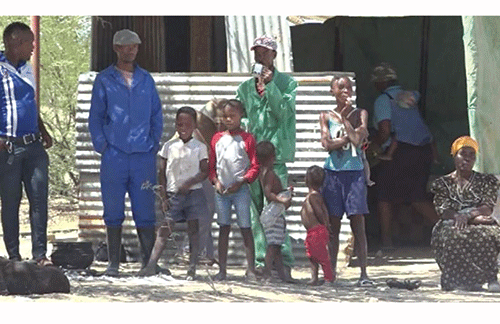FARM OTJIKONDERO – The government recently delivered on its promise to reprioritise and elevate the plight and dignity of evicted generational farmers, who are scattered in farm corridors across the country.
In its latest public notice of beneficiaries of various farming units, the ministry of agriculture announced that the Amseb family of generational farm workers, who were earlier this year evicted from the private farm Yellowbank in the Omaheke region, form part of the new beneficiaries.
The family consists of Jan Amseb, Christofine Amses, Michael Naneb and Lentib Garuxab, who all finally have a place to call home and continue with their farming activities, which is their only source of income. Generational farm workers are generally defined as farm workers who were born, live and work on farms for many generations. These farm workers have no other place they call home, apart from the farm on which they were born and worked for generations.
In 2020, the government, through the ministry, announced it would develop a policy that would protect generational farm workers by providing alternative residences or a portion of the land to such workers.
The latest efforts are part of those ongoing plans by the government to resettle and assist generational farm workers. The agriculture ministry’s spokesperson, Jona Musheko, said government will continue to address the plight and rights of generational farm workers orderly and systematic manner, and within the confines of available resources.
“We are attending to these cases (evicted farm workers), including those who may be farming in corridors, and it will help them one by one through the right procedures, according to the resettlement process. All these people – one can see they are elders and obviously have families that need land to call home. Amongst them, there’s also a proportion of beneficiaries that have the potential to utilise the land for commercial agriculture,” he said.
It is not just about the elderly generational farm workers, Musheko said, but also about providing a brighter and more secure future for the children of all those workers who are struggling to make ends meet within the many corridors of farms nationwide.
“If you look at most of the beneficiaries, they are from previously disadvantaged communities, and some are youthful. That speaks to one of our objectives; to address the past land injustices and give it to those who were directly affected,” said Musheko.
Injustices
Farm workers are amongst the most abused and exploited workers in Namibia, with their legal rights often ignored. The legal provisions for paid leave for farm workers are ignored on most farms, and paternalistic and racist labour relations are still widespread.
Most farm workers reside on the farm where they work – about half of them in corrugated iron shacks, and only a minority of farm workers own livestock on the farm, usually small stock (sheep and goats).
Farm workers also spend on average
70% of their earnings on food, leaving them with nothing to save for purposes.
About 90% of generational farm workers are “informally employed” due to the non-existent or suppressed legal provisions to protect their employment rights and plight.
-ohembapu@nepc.com.na



